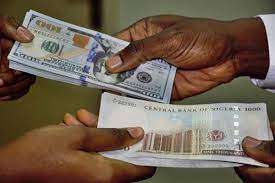The Nigerian naira has plummeted, alarming experts who suggest to us measures that may be used to address the situation.
According to Forbes, naira has reached an all-time low, with the exchange rate hitting ₦1,005 to $1 in the parallel market, according to FORBES AFRICA’s latest findings.
This depreciation represents a drop from around N900 per dollar at the beginning of September.
Observers say the lack of intervention from the Central Bank of Nigeria (CBN) this month has allowed the naira’s value to plummet in the parallel market.
The recent decision by President Bola Tinubu to unify exchange rates in Nigeria led to the CBN’s move towards a free-floating system, allowing deposit money banks (DMBs) and foreign exchange market dealers to freely buy and sell forex at market-determined rates. This shift marked a transition from the previous multiple forex regime to a more flexible approach, implemented on June 14.
Olayemi Cardoso, who was recently nominated and confirmed as the 12th Governor of the CBN, emphasized the importance of economic growth during his confirmation by the Nigerian Senate.
“Our feeling is that in identifying the important issues with economic growth, we believe very strongly that size matters,” said Cardoso. He highlighted the administration’s goal of achieving $1 trillion-GDP within eight years and underscored the need for stability in various economic indices.
But Iheakanwah Felix Arinzeh, a financial expert and doctor of business administration, expresses his concerns to FORBES AFRICA: “The current rate of over N1,000 to a dollar at the forex parallel market is a sign of the lack of confidence in the Nigerian economy.”
The consequences of this decline are multifaceted. It makes importing goods and services more expensive, eroding the value of savings and, according to Arinzeh, is likely to lead to higher inflation and operational challenges for businesses, especially those already struggling.
Arinzeh emphasizes that Nigerians’ reliance on the parallel market for foreign exchange stems from disruptions in the official supply of foreign exchange through the CBN.
“Factors contributing to the naira’s decline include global currency shortages exacerbated by events like the Ukraine war, Nigeria’s high debt levels, and overreliance on oil exports.”
To combat these challenges, Arinzeh proposes a series of measures, such as “addressing the underlying causes of the forex shortage, including declining oil exports, rising imports, and capital flight”.
Kelvin Emmanuel, an economist, highlights the situation of the naira to FORBES AFRICA, stating, “The drop of the naira above 1,000, and the quotes seen on exchange traded platforms for currency futures at N1,200, explain the pressure on the spot markets to provide the liquidity the market requires for various critical financial transactions, including Form A, M, Q, matured (commercial) Letters of Credit, capital remittances, and dividend remittances.”




